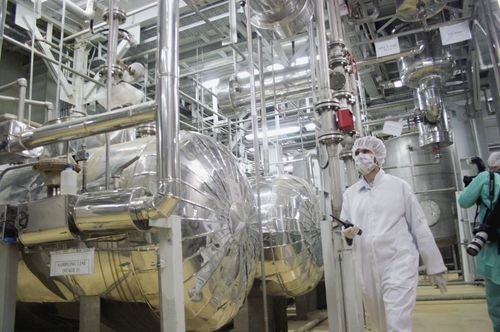Iran reaches deal with global nuclear watchdog for inspections over the next 3 months

The International Atomic Energy Agency (IAEA) has struck a deal with Iran that will give its inspectors continued access to verify and monitor nuclear activity in the country for the next three months, potentially laying the ground work for Washington and Tehran to kick-start nuclear talks.
IAEA Director-General Rafael Grossi said Sunday that the two sides had reached the temporary “technical understanding” following his trip to Iran, which had recently signaled plans to scale back cooperation with the global nuclear watchdog.
Iran announced last week it would stop implementing the IAEA’s additional protocol, effectively limiting which facilities nuclear inspectors could scrutinize and when they could access them, making it harder for experts to determine if Tehran is attempting to develop nuclear weapons.
The interim deal reached Sunday would alleviate the impact of Iran pulling out of the additional protocol, Grossi said. “What we agreed to is something that is viable, it’s useful to bridge this gap that we are having now, salvages the situation now,” he said.
While the same number of international inspectors will remain in Iran, Grossi said, their access to nuclear facilities will be more limited and they will no longer be allowed to conduct last-minute “snap inspections.”
“This is not a replacement for what we used to have. This is a temporary solution that allows us to continue to give to the world assurances of what is going on there, in the hope that we can return to a fuller picture,” said Grossi.
IAEA monitors had been granted sweeping inspection rights as part of the 2015 Joint Comprehensive Plan of Action (JCPOA), a landmark agreement that was intended to limit Iran’s nuclear program and prevent the country from developing nuclear weapons in exchange for sanctions relief. Iran has long held that its nuclear program is intended for peaceful purposes, despite skepticism from the international community.
Former US President Donald Trump viewed the 2015 deal as too generous to Tehran and abandoned it in 2018. In response, Iran gradually scaled back its commitments to the accord. That has included enriching uranium — the fissile material used to make nuclear bombs — at higher levels than agreed upon.
In January, Iran said it had resumed enriching uranium to 20% purity, far beyond the 3.67% cap laid out in the 2015 nuclear deal. On Monday, the country’s supreme leader Ayatollah Seyyed Ali Khamenei said Iran could go further, enriching uranium to up to 60% if needed to develop new technologies.
“Iran is not after nuclear weapons, but its nuclear enrichment will not be limited to 20% either. It will enrich uranium to any extent that is necessary for the country,” Khamenei wrote on Twitter.
In an additional statement posted on his website, Khamenei said Tehran may need to develop technology such as nuclear propulsion systems to power marine vessels.
“[Enrichment] will increase as the needs of the country requires, for example, for a nuclear thruster or other works we may need to increase the enrichment to 60%,” he added.
Enrichment of 90% or higher is considered weapons-grade.
US President Joe Biden’s administration said last week that Washington was willing to hold talks with Tehran and other signatories to the Iran nuclear deal, even before either side has taken any tangible action to salvage or return to compliance with the agreement.
The two sides had been at an impasse. Washington and Tehran previously insisted that the other must be the first to come back into compliance with the deal.
Iranian Foreign Minister Javad Zarif said that as the party that chose to leave the deal in the first place, the onus remains on the US.
“The United States need to establish its bona fides to come back to the nuclear deal,” Zarif said in an interview with CNN earlier this month. “The United States is not in the nuclear deal, and the United States is not in the nuclear deal because of its own decision to withdraw, without taking the routes that were available to it within the nuclear agreement.”
State Department officials were careful to stress that their willingness to sit down with partners and Iran wasn’t a concession or even the beginning of nuclear talks, but instead, was simply the first diplomatic step to figure out how to begin discussing issues of substance.
“Until we sit down and talk, nothing’s going to happen. It doesn’t mean that when we sit down and talk we’re going to succeed, but we do know that if we don’t take that step, the situation is just going to go from bad to worse,” a senior State Department official said.
Jake Sullivan, Biden’s national security adviser, told CNN last week that US officials were particularly worried about Iran’s decision to refuse to cooperate with the IAEA and that the “first order of business here would be for the Iranians to take the decision to stop the process of moving further out of compliance, and then I do believe that there is a diplomatic pathway.”
“We’re at an early stage here,” Sullivan said. “It’s going to take work, it’s going to take hard-headed, clear-eyed diplomacy, and ultimately it’s going to take a decision by Iran that they are prepared to take the steps required to assure the world, and prove to the world, that their (nuclear) program is for exclusively peaceful purposes.”
Correction: An earlier version of this story erroneously omitted part of Jake Sullivan’s full quote to CNN. It has been corrected.